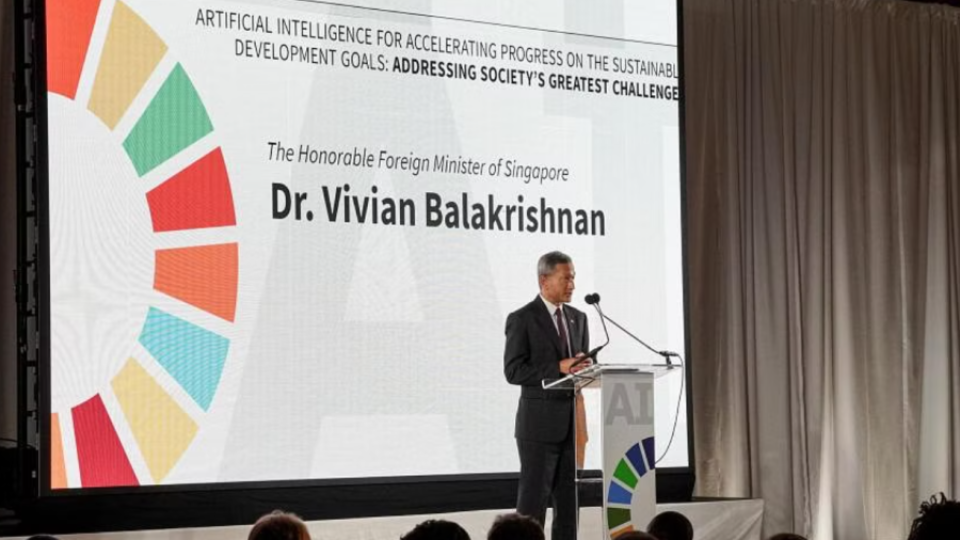September 20, 2023
WASHINGTON – As an early mover in the use of artificial intelligence (AI), Singapore has tips to share with governments keen to adopt the technology and reap the vast opportunities it brings, while minimising the risks its use entails.
Foreign Minister Vivian Balakrishnan shared the takeaways from Singapore’s journey at a ministerial meeting on the sidelines of the ongoing United Nations General Assembly on Monday.
The meeting, which was convened to discuss AI’s potential in speeding up attainment of the UN Sustainable Development Goals (SDGs), was attended by delegates from the United States, Japan, Britain, Spain, Morocco and Kenya, as well as the world’s leading tech firms, including Google, Microsoft and IBM.
Progress in meeting the SDGs – an end to poverty and hunger, and ensuring affordable energy and quality education systems by 2030 – has been hampered by the Covid-19 pandemic and the Ukraine war.
But AI is a game changer.
Speaking at the meeting, US Secretary of State Antony Blinken said the world was on track to achieve just 12 per cent of the SDGs, but AI could advance progress on nearly 80 per cent of the SDGs and their targets.
However, fears remain that in the absence of international norms to govern the use of AI, the technology could be abused to produce false information, reinforce bias and discrimination, and deepen inequities.
Singapore’s stance has been to embrace the potential of AI, Dr Balakrishnan said.
Besides, the tiny city-state could hardly afford to sit on the sidelines, he added.
“Our attitude is that this is a big deal. This is transforming the means of production in the world. And for a little place like Singapore to be relevant, we had better get on the bandwagon.
“We can’t compete with Silicon Valley, but we can be a vital node which Silicon Valley needs, even as it spreads its web across the world.”
So, Singapore is making use of AI while also building in safeguards, said the minister.
For example, the civil service uses large language models that are trained on large amounts of text data and are able to generate human-like text.
The Ministry of Sustainability and the Environment uses AI models to prepare for extreme weather events, while the fish farming sector uses them to enhance biosafety and improve yield.
“We are just doing this and, if need be, doing it within sandboxes, because the only way to get on this bandwagon is to do and to learn from doing, and to learn from those mistakes. Fail quickly and improve it,” Dr Balakrishnan said.
For governments that want to be early adopters, “it’s critical to have the right safeguards and guidelines in place for the responsible use of AI”, he said. “And demonstrably so, so that people can judge that you’re not just experimenting with the data and taking liberties with their data, but you’re doing it in order to improve the quality of services provided to the people.”
Singapore moved early with regulation efforts, releasing its model AI governance framework in 2019.
This provides guidelines to the private sector and also assures people that key ethical and governance issues have been baked in.
In 2022, an international pilot for AI governance testing framework, called AI Verify, was rolled out. This was then expanded to include a diversity of inputs by roping in the private sector.
“It is critical that this not be purely a government venture, you do need to get the private sector involved. You do need to get civil society and other stakeholders who have real skin in the game as you generate the appropriate regulatory framework,” he said.
This evolved into the AI Verify Foundation, launched in June 2023, to harness the global open source community to develop AI testing tools. Its membership now stands at more than 60 organisations, including IBM, Google and Microsoft.
“This is a public-private-civic partnership. That kind of multi-stakeholder engagement and approach is essential,” said Dr Balakrishnan.
The age of just trusting Big Tech to regulate itself is over, he said.
“You now need regulations. The political dialogue and conversations, both domestically and internationally, will have to occur.
“We do need to understand that just as AI has transformed the scene, the old ways of regulating, cooperating and legislating will not suffice. We do need to break new ground.”
Other speakers, including Spain’s Secretary of State for Digitalisation and Artificial Intelligence Carme Artigas, agreed, saying: “We need an international AI governance framework and, here at the UN, we are in the right place to do that.”
Spain has established Europe’s first AI policy task force, while the European Union expects to enact the world’s first comprehensive legislation on AI by the year end.
Several meetings are planned in 2023 to develop international norms, such as Britain’s AI Safety Summit in November, and India’s Global Partnership for AI in December.
Dr Balakrishnan and Second Minister for Foreign Affairs and Education Maliki Osman are in New York this week to attend the UN meetings.
On Friday, Dr Balakrishnan will deliver Singapore’s national statement at the General Assembly.

